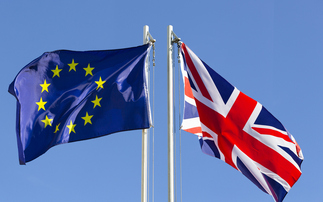The US president has just forced climate action up the global political agenda - expect a new wave of investments and bold policy moves to follow
The reaction to Donald Trump's indefensible decision to exit the Paris Agreement is the most heartening development in climate politics since the Paris agreement was signed. The decision itself remains a contemptible abrogation of duty by a man who seems certain to be remembered as little more than a tragic piece of performance art designed to demonstrate how craven media apologists are capable of being - assuming, that is, he is not remembered by a few cave dwelling survivors as the man who triggered nuclear annihilation. The word soup attempt at an explanation for why the world's largest superpower regards adhering to voluntary goals it could change at any time as unfair defied both logic, truth, and decency. The American novelist Dave Eggers' peerless description of the President as a man who "cannot spell and does not read" has never felt more apt.
But the reaction was something else entirely. I have been racking my brain and cannot think of another example where a sitting president has sparked such sustained and wide-ranging criticism from the business community and supposed allies. Business leaders may have strong opinions on matters of war and peace, but they tend to keep their counsel for obvious reasons. They have historically been a bit slow in commenting on issues of civil rights. They will often comment on policy decisions impacting their businesses, but it is rare for them not to hedge their criticism slightly, to acknowledge the tough decisions politicians have to make and seek the upsides in any policy.
In contrast, the reaction to Trump's Paris strop from individual businesses and groups representing thousands of firms and investors has been unequivocally damning. His critics even stuck to words the President could understand. Apple CEO Tim Cook called the decision "wrong". Facebook's Mark Zuckerberg called it "bad". Tesla's Elon Musk and Disney's Robert Iger quit the President's advisory councils in disgust. Michael Bloomberg took trolling to a beautiful new level by offering to cover the cost to the UNFCCC of the US quitting the group. And Lloyd Blankfein, chief executive of Goldman Sachs, used a format Trump is familiar with to tweet: "Today's decision is a setback for the environment and for the US's leadership position in the world". Although, to really catch the President's attention he should probably have included some indecipherable typos.
Those rallying to defend the President's decision have come exclusively from the same lobby groups, fossil fuel interests, and right wing hacks that provided much of the deeply flawed economic analysis the White House used to justify its decision. But even here the modest ranks of the President's allies are notable for the absence of many of the oil majors who publicly declared that they support both the Paris Agreement and the US's continued commitment to decarbonisation.
It is no coincidence that Trump's approval ratings are at record lows. Not only do many businesses disagree with his approach to climate change and the environment, the fact his brand is now so toxic makes speaking out a more sensible approach than keeping their frustrations private. His reprehensible and insulting response to the latest terror attack in the UK will only encourage more business leaders to recognise there is immense reputational damage to be done from being associated too closely with this administration.
I must admit I was prepared to be more than a little cynical at the inevitable positive spin green groups would try to put on Trump's quitting the historical deal. I understand the argument that technology and changing markets mean Trump cannot derail the low carbon transition; these arguments are completely justified - clean technologies will continue to prosper. But, as President Obama used to say, there is such a thing as being too late on climate change. Trump does have the potential to slow the pace of decarbonisation and hamper the emergence of new clean technologies. We cannot have it both ways. The Paris Agreement cannot be both a significant breakthrough one minute and immune to the withdrawal of the world's largest economy the next.
However, the reaction to Trump's speech suggests that while the US leaving the agreement is a blow it can be more than offset by the kick-start it will give to other countries and businesses decarbonisation efforts.
You would expect the former UN climate change chief Christiana Figueres to put a positive spin on Trump's decision, but her assessment already feels prophetic:
Thank you Trump. You have provoked an unparalleled wave of support for Paris and determined resolve on climate action. Deeply grateful.
— Christiana Figueres (@CFigueres) June 2, 2017
The crucial aspect of the wave of outrage Trump sparked last week is to be found not in the criticism itself, but in the willingness of political and business leaders to crank up pressure on themselves to now deliver on the decarbonisation goals of the Paris Agreement.
Take France's Emmanuel Macron as the prime example. In his goading of the US president he has made action on climate change more central to his political credibility than any world leader in history - he now has no choice but to deliver meaningful action. Similarly, Angela Merkel knows her emerging position as the new leader of the free world depends on her ability to accelerate climate action. China and India have invested considerable political capital in challenging the Trump administration's assertion that they are free-riders who are failing to take steps to cut their carbon emissions - with a multi-trillion dollar global clean tech market as the eventual prize they are only going to double down on their green efforts.
Trump has even ensured climate change secured a sizeable walk on role in a UK election for the first time ever, even if the government's transparent attempt to secure a post-Brexit US trade deal meant it was reluctant to join the chorus of disapproval. Whoever wins the election will have to deliver on the UK's Paris Agreement goals and the growing antipathy of the British public towards Trump will only marry with the immense popularity of clean technologies to intensify pressure on Ministers to act.
The businesses and US states that have condemned Trump's decision now face a similar challenge. The environmental and long-term economic cost of failing to tackle escalating climate risks has always been obvious, but increasingly we are starting to see the political costs become more apparent. If you call out the US president for a wrong-headed decision you had better make sure you then prove why it is so wrong.
The one part of Trump's critique of the Paris Agreement that held water was the assertion that it was inadequate, that it would not solve the crisis of climate change. Of course, it was always a straw man argument to use this as a reason to exit the deal, because everyone knew it would need to be strengthened over time. The process of strengthening it was meant to start from 2020 onwards, but Trump's attempt at diplomatic vandalism has only fast tracked the next phase of climate action.
Expect Macron, Merkel, Modi, Xi, and perhaps even the next British Prime Minister to come forward with more ambitious emissions reduction plans and low carbon investment rounds in short order. Expect the debate on carbon border tariffs to reignite and efforts to expand carbon markets to accelerate. Expect corporate investment in clean tech R&D and renewables deployment to continue to accelerate. Expect much bolder policies and targets, more 100 per cent renewables pledges, more conventional car bans, more full blown divestment. Expect US states to call the GOP's bluff and demand an alternative plan for tackling emissions as a matter of urgency. The one downside of global consensus is that it always risks becoming too cosy - Trump has shattered that consensus, and in so doing has fired the starting pistol on a new race to prove who can get furthest away from his scientifically illiterate, high risk world view in the shortest space of time.
Trump's unpopularity may even provide the GOP with the break from the climate scepticism that more thoughtful US conservatives have been seeking for years. The backlash against the most woeful President in history is building like a force 10 hurricane looming towards a Florida golf course - those who have hitched their deeply flawed economic and environmental ideology to Trump's nationalist wagon could soon find their new friend is hardly a reliable ally.
Figueres is right, perhaps we should thank the US President; assuming of course his next step isn't getting in to a shooting war with a nuclear power over proposed carbon tariffs, which sadly feels like the kind of possibility we can no longer completely rule out.










